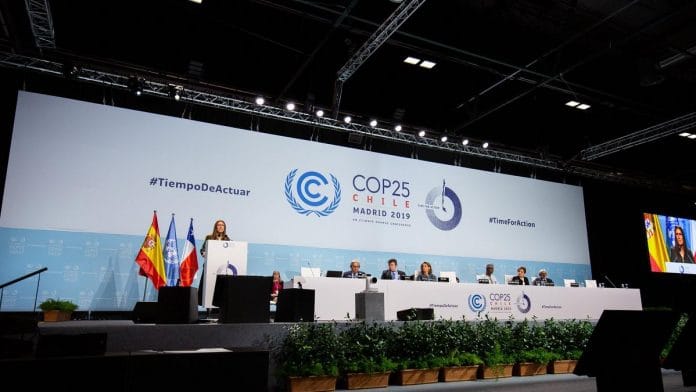London/Madrid: With two days to go before the scheduled conclusion of the United Nations climate talks in Madrid, envoys from almost 200 nations remain divided about how to bring market mechanisms into reducing greenhouse gas emissions.
The delegates are working on rules that would govern carbon markets under the 2015 Paris Agreement, where all nations pledged to reduce fossil fuel pollution blamed for warming up the atmosphere.
Industrial nations and environmental groups want a system with strict rules that guarantee genuine reductions. Countries from Brazil, to Australia and Saudi Arabia are digging their heels in on the same technical issues that have dogged these annual gatherings for years. They want more flexibility for the mechanism to draw in investment. Observers are concerned these disputes may not be resolved in time.
“Where we need to be is to prevent loopholes in the Paris Agreement, and to me, having this high-level pressure on the deal is a risk,” Gilles Dufranse, policy officer at Carbon Market Watch, a Brussels-based research group. “If we have a deal for the sake of a deal, it will destroy the Paris Agreement.”
The debate all concerns Article 6 of the Paris deal, a section of the 27-page pact that made way for carbon market mechanisms without setting out how they will work. Here are the main issues that still need to be resolved before the meeting wraps this weekend:
Worthless Kyoto credits
Countries like Brazil, Australia and India are sitting on credits representing millions of tons of carbon emissions left over from an old program created in the 1997 the Kyoto Protocol. Those credits are now virtually worthless after the price collapsed. Nations that still have those securities should want those Clean Development Mechanism credits to be recognized under the new system. But opponents say that carrying-over old credits would dilute the new framework and undermine efforts to slash emissions.
Double-counting
Countries and companies can trade credits representing emission reductions in order to hit their targets. The country that sells the credit then has to make an adjustment to its accounting to reflect the sale. Some countries — led by Brazil — are pushing for the sale to be counted by the seller. That might allow sellers to get credit twice for the work they did on a single project, which would weaken efforts to cut pollution.
“Article 6 is about double-counting, no cheating, and it has to be rightly drafted. We should not organize a trade-off between Article 6 and ambition,” said Laurence Tubiana, chief executive officer of the European Climate Foundation, and one of the architects of the Paris deal.
Overall cuts in global emissions
UN carbon markets have until now worked under the logic of offsetting — if a country without targets cuts one ton of carbon emissions somewhere, a rich nation could by the rights to that reduction help comply with its own pledges. That worked when only industrial nations had targets. Now all nations have limits, envoys are seeking to tighten the system so that reductions are actually made instead of passed around between nations.
One idea is to cancel a portion of credits if they are arriving from outside the industries covered by Paris pledges. Countries cannot agree on which section of the deal overall reductions should sit.
What else?
Non-governmental organizations were alarmed when they found that language detailing human rights protections were removed from a draft text this week. The function of that is to ensure that renewable energy projects don’t harm vulnerable communities.
Jake Schmidt, managing director of Natural Resources Defense Council’s international program, said there are are two credible options that could emerge by the weekend. Politicians could decide it’s just too difficult get an agreement this year and push the matter off for another year. The other alternative is for negotiators to set out a broad set of principles which they will make more detailed over the next few years.
“Some magic political dynamic may materialize, but we’ll come out of here with a punt on defining rules,” Schmidt said. “And then you’re kinda punting it down the road but you’ve kept hope alive.” -Bloomberg
Also read: Sydney’s air pollution is so bad it’s setting off fire alarms






